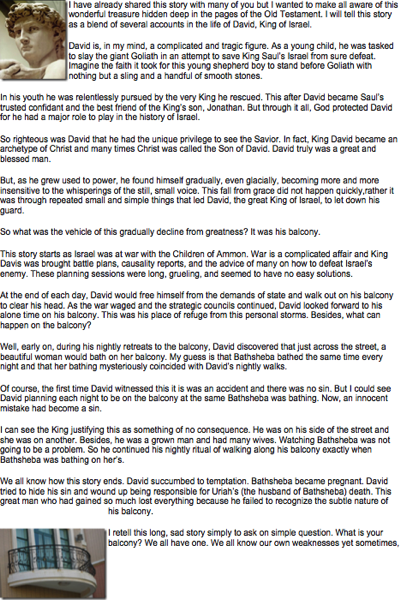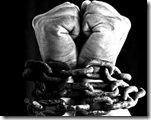The following is a message from Kaylie Sikahema.
 Being a woman in today’s world can be confusing, and difficult to navigate. We hear from hundreds of sources what our role in society is, and what gender has to do with that role.
Being a woman in today’s world can be confusing, and difficult to navigate. We hear from hundreds of sources what our role in society is, and what gender has to do with that role.
 On one end of the spectrum we have women objectified and treated as though they were only values by their bodies and appearances. On the other end of the spectrum, we are told to completely reject the natural differences between men and women, and expect total and complete sameness, and nothing less.
On one end of the spectrum we have women objectified and treated as though they were only values by their bodies and appearances. On the other end of the spectrum, we are told to completely reject the natural differences between men and women, and expect total and complete sameness, and nothing less.
Obviously most individuals don’t occupy either of these two extremes, but often, we as women do place ourselves somewhere on the edge of these extremes; whether it is being overly concerned with our image and comparing ourselves with the images of others, or whether it is feeling the angst of women full of femininity.
 Let me be clear, I do not feel femininity itself is a bad thing. Yes, it can lead to ideas, feelings, and images that are more harmful to women then helpful. I’ve been in both of these places, so I guess that’s why I feel okay talking about it.
Let me be clear, I do not feel femininity itself is a bad thing. Yes, it can lead to ideas, feelings, and images that are more harmful to women then helpful. I’ve been in both of these places, so I guess that’s why I feel okay talking about it.
But here’s the thing I want you to know about the breadth of this spectrum. Each of us must work to find a happy medium.
It is good to learn how to take care of your body and present yourself in a nicely dressed, well groomed way without becoming obsessed with the materialism of it or objectifying yourself. It is also good to know that, yes, women are equal to men and that, yes, we deserve to be treated fairly and with respect in any scenario without expecting to be men.
Emily and I are writing these posts at the Bishop’s request. He feels that some in this ward, both men and women, may struggle with purpose, presentation, and perception of femininity.
Bishop referred specifically to girls who want to pursue marriage, but just feel like they are constantly “one of the guys.” However, I think that the misperception of femininity goes beyond that; I think every single woman in the church can relate to the difficulty of defining herself as a woman, and what and who that woman is supposed to be.
But here’s my thing, girls.
 There is always going to be another argument. There is always going to be a spectrum to gauge. There are always going to be things to distract, degrade, and deface you. Satan himself is working so arduously at this very thing. You may have heard Sister Dalton this morning. (And if you didn’t, for heaven’s sake go listen to that talk!!) Women have power. Power we don’t even know we are capable of. And Satan knows it.
There is always going to be another argument. There is always going to be a spectrum to gauge. There are always going to be things to distract, degrade, and deface you. Satan himself is working so arduously at this very thing. You may have heard Sister Dalton this morning. (And if you didn’t, for heaven’s sake go listen to that talk!!) Women have power. Power we don’t even know we are capable of. And Satan knows it.
So.
My take on all of this? My advice?
 Pray.
Pray.
If you want to be more feminine, more attractive to your future eternal companion, tell Heavenly Father. If you want to struggle less with the angst of femininity, if you want to feel more peace about your place in God’s kingdom -- pray. If you are sick of being “one of the guys” and you want to be seen for the beautiful daughter of God that you are-- pray. Forget about the spectrum for a minute. Forget about the world’s definitions, and expectations, turn to the one who knows you best. He has promised to help you.
And then after you pray?
 Study.
Study.
Open your heart to the scriptures, and I promise you the Holy Spirit will lead you to specific insights about the minor course corrections you can make to confidently define yourself as a daughter of God. God will help you to learn what things you can do, what small changes you can make to not only be worthy of and ready for one of his valiant sons, but also the changes you can make to recognize the beautiful woman of God He wants you to become.
 I wish I could give you some specific things you could do, I wish I could just sit you down and tell every single one of you how incredible you are, I wish I could just hand you confidence in the fact that you are a daughter of God.
I wish I could give you some specific things you could do, I wish I could just sit you down and tell every single one of you how incredible you are, I wish I could just hand you confidence in the fact that you are a daughter of God.
But that’s the beauty of it. I can’t! And because I can’t, you get to seek out a relationship with Him. And by doing so, you get to divinely define yourself in a way that no worldly endeavor possibly could.
However, I do believe that we have the ability and responsibility to learn from each other. So let’s make this a discussion, shall we?
I’m open to responses.




















































